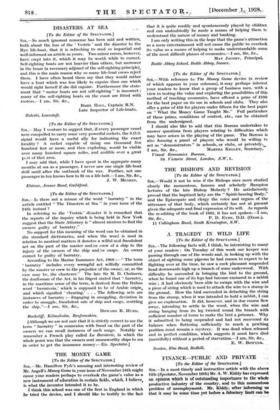[To the Editor of the SPECTATOR.] SIR, —Is there not a
misuse of the word " barratry " in the article entitled " The Disasters at Sea " in your issue of the 24th instant ?
In referring to the Vestris ' disaster it is remarked that the reports of the inquiry which is being held in New York suggest that the State Attorney is " almost anxious to find the owners guilty of barratry."
No support for this meaning of the word can he obtained in the standard dictionaries, and when the word is used in relation to nautical matters it denotes a wilful aud fraudulent act on the part of the master and/or crew of a ship to the injury of the owners of the ship and/or cargo. An owner cannot be guilty of barratry.
According to the Marine Insurance Act, 1906 :—" The term ' barratry ' includes every wrongful act wilfully committed by the master or crew to the prejudice of the owner, or, as the case may be, the charterer." The late Sir M. D. Chalmers, the draftsman of the Act, in his Digest stated that " barratry, in the maritime sense of the term, is derived from the Italian word barrateria,' which is supposed to be of Arabic origin, and which signified ' cheating.' . . . The following acts are instances of barratry :—Engaging in smuggling, deviation in order-to smuggle, fraudulent sale of ship and cargo, scuttling the ship."—I am, Sir, &c.,
[Although we are not sure that it is strictly correct to use the term " barratry " in connexion with fraud on the part of the owners we can recall instances of such usage. Notably we remember a French play called La Baraterie, in which the whole point was that the owners sent unseaworthy ships to sea in order to get the insurance money.—En. Spectator.]








































 Previous page
Previous page